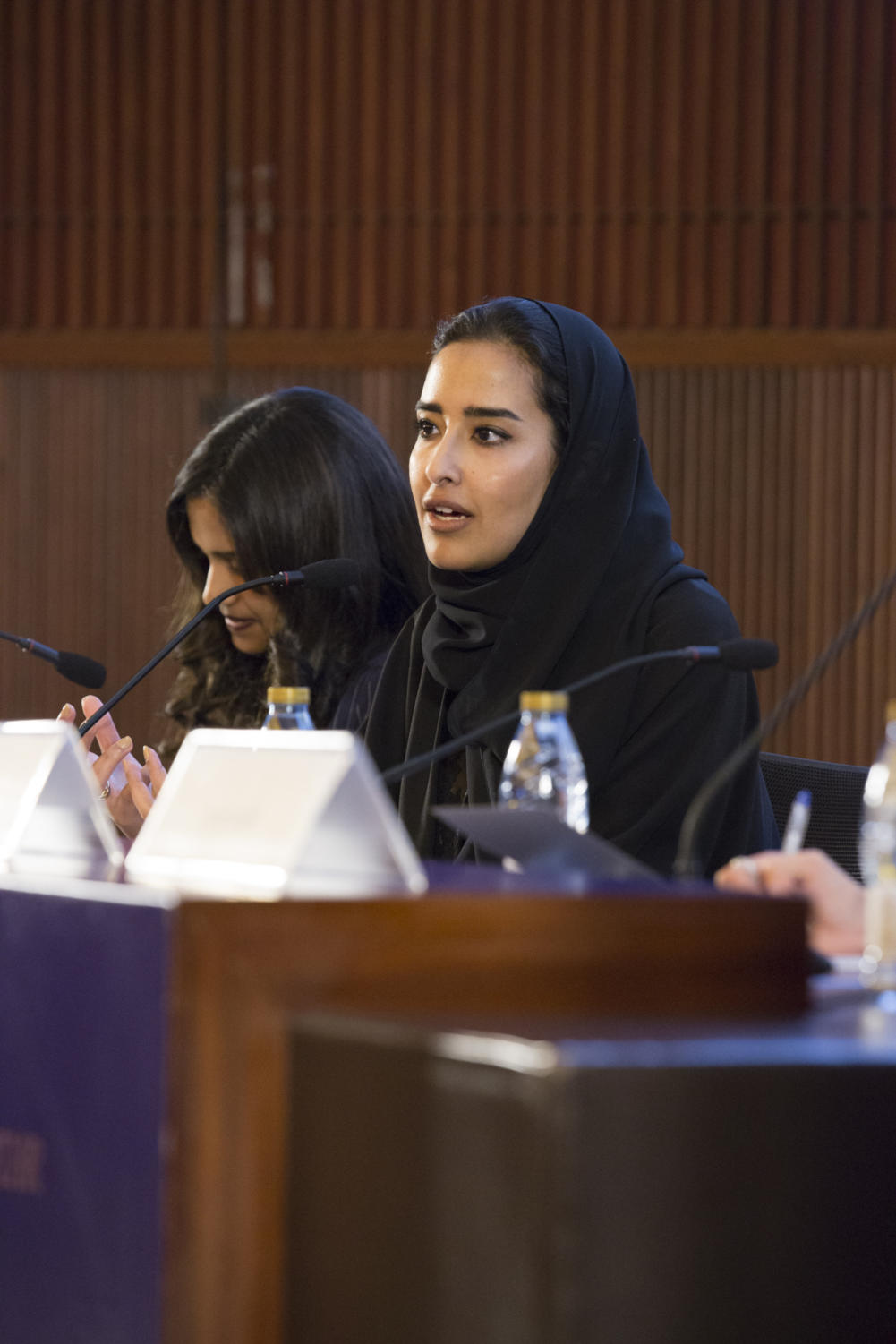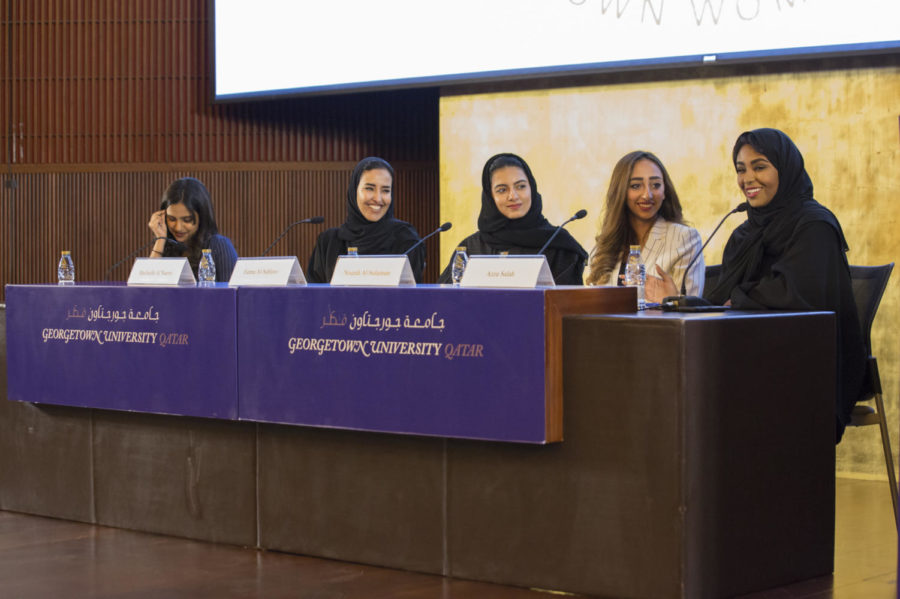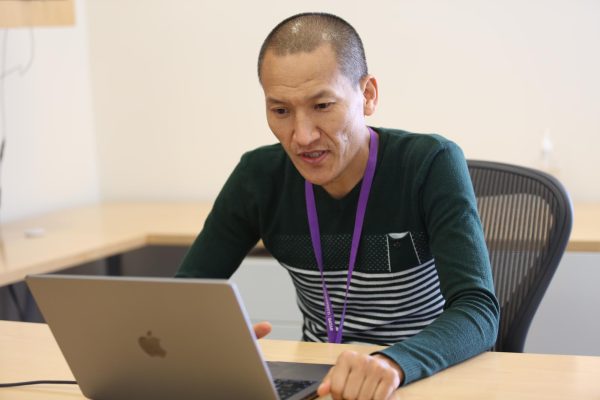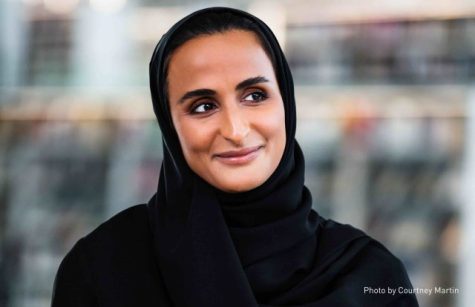Successful local career women break through the glass ceiling
(From left to right) Ritica Ramesh, event organizer, Machaille Al-Naimi, Qatari lawyer, Fatima Al-Sahlawi, Qatari architect, Nourah Al-Sulaiman, outreach manager of Insaniyat from Kuwait, and Azza Salah, CEO of Sky Climbers. Photo provided by GU-Q.
Putting a woman on your senior management team will enhance your business, the founding dean of the College of Humanities and Social Sciences at Hamad Bin Khalifa University Amal Al-Malki said at Georgetown University in Qatar on March 27.
Three Qatari and a Kuwaiti woman shared the challenges they faced and their experience of shattering the glass ceiling in their professional lives.
“Qatar does not lack successful women. What Qatar lacks is a venue for women to discuss the barriers they face,” said Asma Al-Jehani, the president of The Future is Female, a club that hosts events to encourage women to be active participants in the workforce. She and the 14 other members of her club organized the event.
The glass ceiling is a metaphor used to describe the barrier that stands between women and their success. It is a typically sexist social barrier that women have to overcome.
“A glass ceiling exists, whether we like it or not. Qatari women still find it difficult to reach leadership positions and when they do, they become easy targets for sexist criticism,” Al-Malki said.
Qatari women still find it difficult to reach leadership positions and when they do, they become easy targets for sexist criticism
The Qatari lawyer
Machaille Al-Naimi, a pioneering Qatari lawyer, said that she is the first Qatari to ever pass the New York bar test and become a lawyer in the United States. She wanted to escape the label of “female Qatari” lawyer and receive recognition as a lawyer without labels.
Her father allowed her to enter the male-dominated profession. But she faced a lot of challenges from her other family members and friends who did not understand.
The Qatari architect
Fatima Al-Sahlawi, an architect at Qatar Museums and nicknamed a ‘trailblazer’ in architecture by the Future is Female members, highlighted the barriers she overcame.
She said when applying for scholarships to study architecture abroad, her academic advisor doubted her. She told Al-Sahlawi that she will not find a job when she comes back to Qatar and even if she did, she would not be able to go onsite because, as a woman, she cannot deal with construction workers. In other words, she would not be able to practice field work, Al-Sahlawi recounted.
But Al-Sahlawi and her parents disregarded this advice as a misconception of the profession and moved forward. She earned her degree in architecture from the American University of Sharjah and returned to Qatar. However, as a woman, she was given administrative work at her company and was vaguely called a “designer.”
“We [she and her colleagues] became this introverted group of female designers,” she said. Al- Sahlawi refused to settle and left the company. She joined Qatar Museums where she now works in the field and communicates face-to-face with her clients.
All the women had a common denominator with each other—their supportive parents who pushed them to be the successful individuals they are today.
“We need to promote strategic role models; we are done with cosmetic role models,” Al-Malki said.

Al-Naimi said her role model is her father.
“He would always ask us, my sisters and brothers, but particularly the girls, who we wanted to be, what we wanted to achieve and how we wanted to contribute. Constantly asking us this question really shaped who we are today,” she said.
The Kuwaiti advocate for migrant workers’ rights
Noura Al-Sulaiman, hailing from Kuwait, is the student outreach manager of ensaniyat, a project that aims to raise awareness of the laws protecting migrant workers in countries like Qatar and Kuwait. She said she was not taken seriously when discussing issues of labor workers and their rights.
“Whenever I’d try to raise the conversation, they’d [her relatives and family friends] dismiss me, telling me ‘you’re just thinking with your emotions, don’t be emotional, don’t sympathize,’” Sulaiman said.
Her family also discouraged her from her dream—studying law in the U.S.—even though they were the same people that taught her to dream. She was told by some family members that women do not leave the country and study abroad, so she ended up studying international relations at The American University of Kuwait.
However, she never gave up on her dream of fighting for the rights of migrant workers and has been active in raising awareness of laws that protect migrant workers in Qatar and Kuwait.
The Qatari CEO of Sky Climbers
The conversation was wrapped up by another Qatari woman Azza Salah, founder of Sky Climbers, the first Qatari company to support talented youth by providing art training and personal development courses.
The Ministry of Art and Culture approached Salah when was 16, asking her if she can do a voice-recording for them. Three years later, she became the assistant director in the ministry and directs a variety of theatre performances around the world.
“If someone is trying to neglect you or look at you in a different perspective, or put you in a specific frame, play in that frame and be smart about it,” Salah said.
“When I wanted to study media, I was not allowed because my father said I won’t find a job. I was already working. He said girls should not be on TV, it is a talent [not a legitimate occupation]; you should be smarter than this,” she recounted.
Despite her father’s concern, Salah earned her bachelor’s degree in media studies. She founded her own company and then was then appointed as the head of strategic planning and performance at Qatar University.
“When you are someone of value, gender does not matter,” she said.















